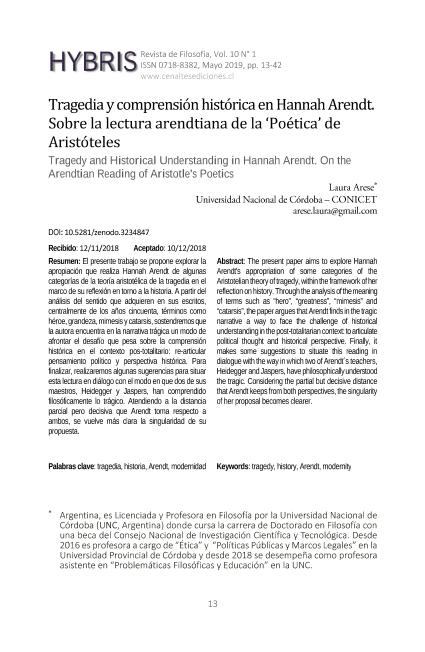Mostrar el registro sencillo del ítem
dc.contributor.author
Arese, Laura

dc.date.available
2021-02-02T19:51:50Z
dc.date.issued
2019-05
dc.identifier.citation
Arese, Laura; Tragedia y comprensión histórica en Hannah Arendt: Sobre la lectura arendtiana de la "Poética" de Aristóteles; Cenaltes; Hybris; 10; 1; 5-2019; 13-42
dc.identifier.issn
0718-8382
dc.identifier.uri
http://hdl.handle.net/11336/124518
dc.description.abstract
El presente trabajo se propone explorar la apropiación que realiza Hannah Arendt de algunas categorías de la teoría aristotélica de la tragedia en el marco de su reflexión en torno a la historia. A partir del análisis del sentido que adquieren en sus escritos, centralmente de los años cincuenta, términos como héroe, grandeza, mimesis y catarsis, sostendremos que la autora encuentra en la narrativa trágica un modo de afrontar el desafío que pesa sobre la comprensión histórica en el contexto pos-totalitario: re-articular pensamiento político y perspectiva histórica. Para finalizar, realizaremos algunas sugerencias para situar esta lectura en diálogo con el modo en que dos de sus maestros, Heidegger y Jaspers, han comprendido filosóficamente lo trágico. Atendiendo a la distancia parcial pero decisiva que Arendt toma respecto a ambos, se vuelve más clara la singularidad de su propuesta.
dc.description.abstract
The present paper aims to explore Hannah Arendt's appropriation of some categories of the Aristotelian theory of tragedy, within the framework of her reflection on history. Through the analysis of the meaningof terms such as “hero”, “greatness”, “mimesis” and “catarsis”, the paper argues that Arendt finds in the tragic narrative a way to face the challenge of historicalunderstanding in the post-totalitarian context: to articulate political thought and historical perspective. Finally, it makes some suggestions to situate this reading in dialogue with the way in which two of Arendt´s teachers, Heidegger and Jaspers, have philosophically understood the tragic. Considering the partial but decisive distance that Arendt keeps from both perspectives, the singularity of her proposal becomes clearer.
dc.format
application/pdf
dc.language.iso
spa
dc.publisher
Cenaltes
dc.rights
info:eu-repo/semantics/openAccess
dc.rights.uri
https://creativecommons.org/licenses/by/2.5/ar/
dc.subject
TRAGEDIA
dc.subject
HISTORIA
dc.subject
ARENDT
dc.subject
MODERNIDAD
dc.subject.classification
Otras Filosofía, Étnica y Religión

dc.subject.classification
Filosofía, Ética y Religión

dc.subject.classification
HUMANIDADES

dc.title
Tragedia y comprensión histórica en Hannah Arendt: Sobre la lectura arendtiana de la "Poética" de Aristóteles
dc.title
Tragedy and Historical Understanding in Hannah Arendt: On the Arendtian Reading of Aristotle's Poetics
dc.type
info:eu-repo/semantics/article
dc.type
info:ar-repo/semantics/artículo
dc.type
info:eu-repo/semantics/publishedVersion
dc.date.updated
2020-11-19T21:06:55Z
dc.journal.volume
10
dc.journal.number
1
dc.journal.pagination
13-42
dc.journal.pais
Chile

dc.journal.ciudad
Viña del Mar
dc.description.fil
Fil: Arese, Laura. Universidad Nacional de Córdoba; Argentina. Consejo Nacional de Investigaciones Científicas y Técnicas. Centro Científico Tecnológico Conicet - Córdoba. Instituto de Humanidades. Universidad Nacional de Córdoba. Instituto de Humanidades; Argentina
dc.journal.title
Hybris
dc.relation.alternativeid
info:eu-repo/semantics/altIdentifier/doi/http://dx.doi.org/10.5281/zenodo.3234847
dc.relation.alternativeid
info:eu-repo/semantics/altIdentifier/url/https://revistas.cenaltes.cl/index.php/hybris/article/view/271
dc.relation.alternativeid
info:eu-repo/semantics/altIdentifier/url/https://dialnet.unirioja.es/servlet/articulo?codigo=7020934
Archivos asociados
